Q&A: Thailand election
- Published
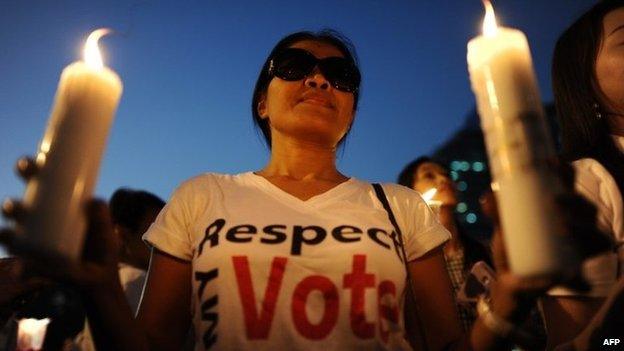
It is unclear if the election result will be seen as credible without participation from the opposition
Thailand is holding parliamentary elections on 2 February amid anti-government protests which show no sign of subsiding. The government called the snap election to try to quell the unrest which has swept the capital and to confirm its mandate to govern.
Tensions are running high and there are fears that violence could break out at the polls.

Why is the election atmosphere so tense?
The poll is being held in a nation which is politically polarised.
The demonstrators do not want the election to take place. These activists represent a segment of the urban affluent and middle classes, who have been holding rallies in the capital, occupying public buildings and ministries.
The main opposition Democrat Party, which is allied to the protesters, is boycotting the election.
On the other hand, the government's Pheu Thai Party has many supporters - sometimes referred to as "red shirts" - in the rural North, where the majority of voters live. Under various different names, the ruling party has won the last five elections.
Thailand's recent history is marked by a string of coups, the latest one taking place in 2006.
The army's support for the current government is uncertain, with the army chief recently making an ambivalent statement about whether or not another coup could take place.

Why do the protesters oppose the prime minister?
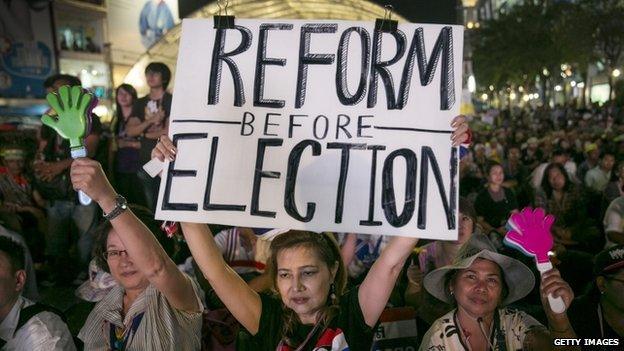
Protesters allege that Ms Yingluck is under the influence of her brother Thaksin Shinawatra
Protesters say Prime Minister Yingluck Shinawatra is too much under the influence of her brother, the former Prime Minister Thaksin Shinawatra, who is the main focus of their anger. Mr Thaksin lives in exile after being convicted of corruption by a Thai court. He was removed by the military in 2006.
The protesters say the Shinawatra family is corrupt and therefore its electoral mandate is meaningless. Instead of an election, they want an unelected "people's council" to replace parliament and clean up Thai politics.

Will this election make a difference?
The splits that have divided Thai society for the past two decades will not be healed by this election. Ms Yingluck will almost certainly continue to receive overwhelming support from the north and east. The main opposition Democrats will continue to dominate in the south and in most parts of Bangkok.
Even if the election passes off peacefully, it will return a parliament without the Democrats. Their persistent inability to win elections has left their supporters disenchanted with electoral politics, and desperate for another avenue of representation. They are likely to continue their support for the protesters. It is unclear how a stable government could emerge in such a situation.
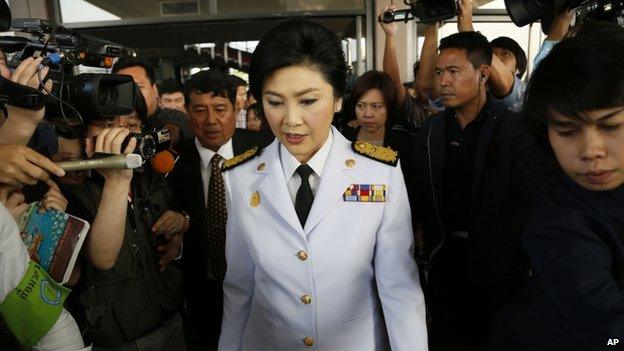
Protesters want an unelected "people's council" in place of Ms Yingluck's government

How has the campaign gone so far?
The campaign has been operating under a state of emergency in Bangkok and the surrounding areas, called by the prime minister to contain potential violence.
Advance voting at many polling stations on 26 January was obstructed by protesters who padlocked gates outside the venues. Some voters were harassed and intimidated when they tried to cast their ballots. A local protest leader was shot dead by unknown assailants.
The day before the election, centres processing ballots became a flashpoint, particularly in Bangkok where a gun battle outside one of the centres wounded six people.
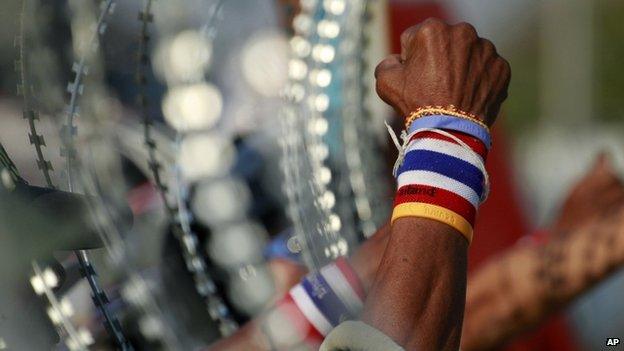
Protesters disrupted advance voting at polling stations in parts of Thailand

How are other voters reacting to the situation?
Some observers have argued that Thais are showing positive signs of a renewed interest in exercising their democratic rights. Pictures have been circulating on social media showing advance poll voters climbing over fences and walking through hostile crowds in a determined attempt to cast their ballot.
A grassroots movement loosely titled "Respect my vote" has gathered momentum, after an activist disturbed a Democrat Party meeting by shouting this slogan which he had written on a placard.
The incident, which has been widely viewed on YouTube, inspired rallies in other parts of Thailand, with people wearing white and calling for the election to go ahead.
BBC Monitoring, external reports and analyses news from TV, radio, web and print media around the world. For more reports from BBC Monitoring, click here. You can follow BBC Monitoring on Twitter , externaland Facebook, external.
- Published22 May 2014
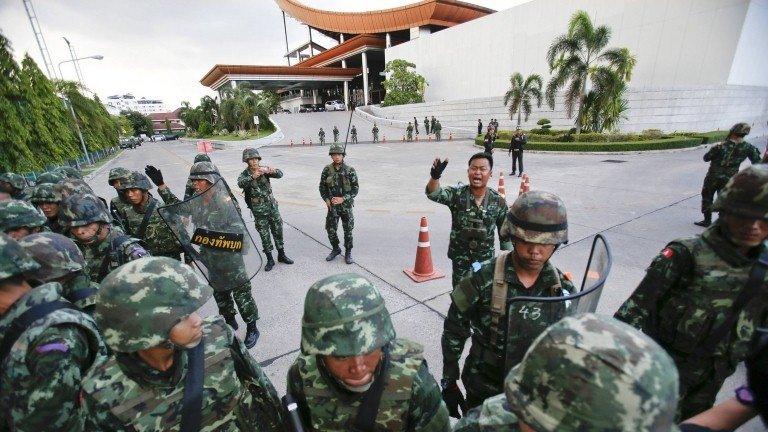
- Published23 August 2017
